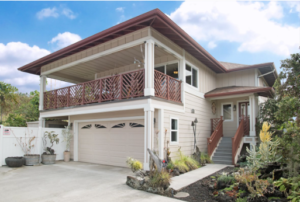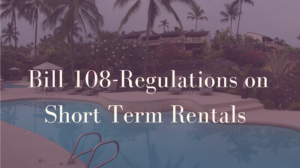 One of the problems plaguing paradise is a lack of affordable housing in Hawaii. This is an issue impacting the entire state of Hawaii and it is playing havoc in Hawaii County, especially in Kailua Kona where 20 people vie for every one available rental, pushing housing costs up. The reason many full-time rental homes are not available? Because people have turned to Airbnb and VRBO to rent out their homes, removing the opportunity for a full-time resident to find a place to live. In residential neighborhoods throughout Hawaii, single-family homes are being used by groups of vacationers, bringing more vehicles to the streets and noise issues to the neighbors.
One of the problems plaguing paradise is a lack of affordable housing in Hawaii. This is an issue impacting the entire state of Hawaii and it is playing havoc in Hawaii County, especially in Kailua Kona where 20 people vie for every one available rental, pushing housing costs up. The reason many full-time rental homes are not available? Because people have turned to Airbnb and VRBO to rent out their homes, removing the opportunity for a full-time resident to find a place to live. In residential neighborhoods throughout Hawaii, single-family homes are being used by groups of vacationers, bringing more vehicles to the streets and noise issues to the neighbors.
LUVA Real Estate understands our client’s desires to purchase a home now, rent it out and retire into it later. This article will help you understand the current issue and pending regulation you need to be aware of if you plan on buying a home and using it as a vacation rental.
The Hawaii Tourism Authority commissioned a study by SMS Research and Marketing Services that said over the past decade vacation rental listings have increased from 2,000 to more than 10,000, although these numbers may be underestimated. A supplemental search of listings done for HTA showed as many as 27,000 rentals in 2015, appearing in virtually every neighborhood in Hawaii. The HTA study said almost 70% of vacation rentals were owned by people who live outside of Hawaii. A report commissioned by Airbnb says 74% of hosts in Hawaii rent their entire property.
So, what has happened?
Concerned residents have asked the County to put regulations on short-term rentals.
First, what is considered a short-term rental in Hawaii County? A short-term vacation rental is defined in the bill as a residential dwelling where the owner or operator does not reside on the building site, that has no more than five bedrooms on the building site for transient use, and is rented to transients for a period of 30 consecutive days or less.
Bill 108 is Hawaii County Council’s first attempt to regulate the increasingly popular Airbnb, VRBO, and other short-term rentals. The county is the only one in the state not regulating such rentals. The bill is an attempt to prevent unhosted short-term rentals in residential and agricultural zones. Existing rentals in good standing in those areas would be able to apply for a nonconforming use certificate that must be renewed annually for a $500 fee. The county estimates there are 8,000 vacation rentals currently operating.
After a May 9, 2018 meeting the council suggested the following:
Setting good neighbor rules for quiet hours from 9 p.m.-8 a.m. During other hours, the noise cannot be louder than “would be otherwise associated with a residential area,” under the amendment. The rules must be provided to the tenant and prominently displayed in the unit.
Amendments also require the owner or designated contact person to reside in the county, provide contact information and respond to complaints within one hour of being notified.
 Bill 108 applies only to un-hosted rentals, where the owner does not live on site. Hosted rentals, such as auxiliary units, home sharing and bed and breakfasts are not addressed.
Bill 108 applies only to un-hosted rentals, where the owner does not live on site. Hosted rentals, such as auxiliary units, home sharing and bed and breakfasts are not addressed.
Existing rentals in good standing in the disallowed areas would be able to apply for a nonconforming use certificate that must be renewed annually for a $500 fee. Good standing means the property must be in use as a vacation rental, paying transient accommodations and general excise taxes prior to July 20.
The rentals in disallowed areas would have 180 days after the bill passes to apply for a nonconforming use permit. The annual certificate could be denied renewal if the vacation rental hasn’t complied with the good neighbor rules. County planning officials say the fee is needed to pay for enforcement of the new program.
The bill went up for a vote on June 6th and was set for a final vote on June 18th, but has been pushed to the first week in July. One of the sticking points is rental homes located in Volcano and Puna, which have been adversely affected by the lava flow. To learn more about the issues affecting that community and how this bill will affect homeowners, please read this article.
LUVA Real Estate will keep you apprised of the final outcome of this bill when it passes. If you would like to learn more about where the “vacation home zones” are in Hawaii County, please contact us directly.